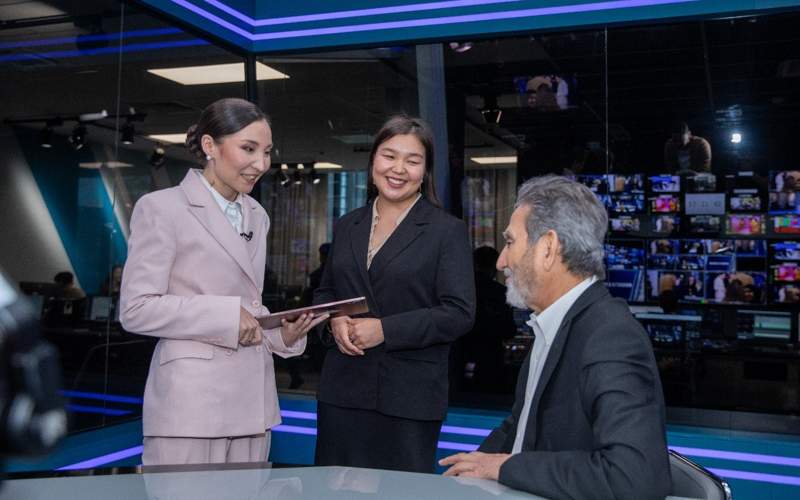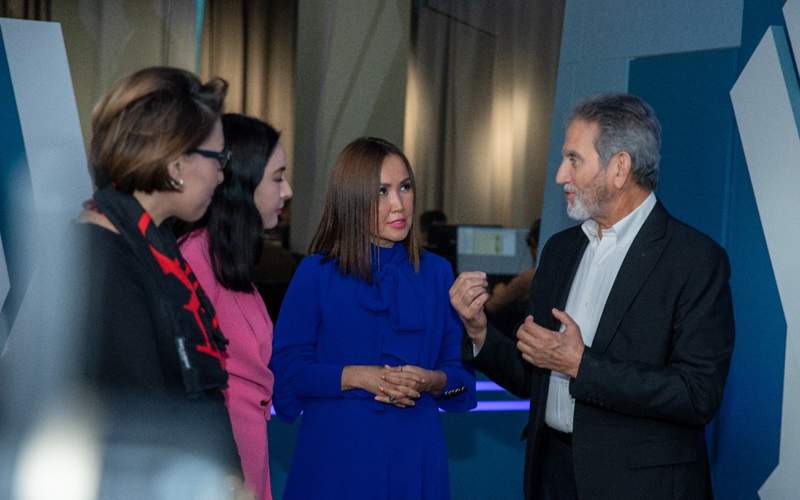Al Jazeera builds bridges with Central Asia: exclusive interview with Dr. Mostefa Souag

As part of the Al Jazeera Week currently taking place in Astana, top management of Al Jazeera Network, including Dr. Mostefa Souag, Acting Director General of Al Jazeera Media Network, met with the team of the TV and Radio Complex of the President of Kazakhstan and familiarized themselves with the activities of the largest media holding in Kazakhstan.
Dr. Souag also spoke to the journalists of the TV and Radio Complex. The full video episode will be available on the Silk Way TV channel this Friday at 1 a.m. Astana time.
Dr. Souag, the TV and Radio Complex of the President of Kazakhstan, and Al Jazeera Network recently signed a memorandum of understanding. We are very pleased with the signing of this document and see that it's already yielded some results. How do you see the cooperation moving forward?
Well, I think Kazakhstan, as a country, is developing in so many ways. There is a real desire and determination to develop the media in the country, which is a very important tool to help development. From the feedback that we got from our team, it is very positive. They said that the students are very motivated, intelligent, talented, and want to learn. Certainly, they are looking forward to becoming journalists and competing in the market. I believe you will have some good journalists then.
For us, starting this training is the first step after signing the MoU between the two sides. I believe we can think about what other things that we can do. I believe we need to have feedback from the management of the television here and from the management of the university and the students. Therefore, we know what is needed to go forward. We have so many courses, and so many possibilities to help.
At the same time, while we are helping, we try to learn. First of all, we learn about the country and the environment here for media work. In case we decide in the future to expand in Central Asia, Kazakhstan would be one of the countries considered. We have a lot of work to be done. This is just the first step.
What can Al Jazeera learn from Central Asia and Kazakhstan, in particular?
I think we will be learning how a country that was, for many years, under the control of the Soviet Union, with very restricted rules on journalism and how that country can go beyond and liberate the media from some of the rules in order to make the media really work for the people of Kazakhstan. That's one thing to learn.
The second thing is that you are such a young country. I believe those are the ones who are going to shape the future of journalism in this region and hopefully participate in shaping the media worldwide. That's very important.
The third thing that we can learn from Kazakhstan is how we can work in this region and what we can do. There are so many things that are possible to do, especially when you look into the history of the country. We have about 10 centuries of common history between Central Asian countries and the rest of the Muslim world. This part of the world was contributing to the Islamic civilization in a way that is even now still recognized. That's also what we need to deal with and hopefully, get enough material, enough content produced to present to our audience so they can learn from the country and from the reader.

Are there any specific plans to expand to the Central Asia region and maybe to the Commonwealth of Independent States?
We don't have a specific plan to expand as a television station or even a digital platform dedicated to the region or to the country. We don't have one yet. It's something that we need to study. We need to see what the possibilities are, from a financial point of view, from a legal point of view, and, of course, from a professional point of view, and see whether Al Jazeera adding something here would be useful for the people of the region. Because you don't do something that people are not interested in. Hopefully, that will take some time. This is our first glimpse into the country. We believe that there are so many opportunities. I am very impressed with the country and with what you are doing in order to develop. That would bring something in the future. But we don't have something very specific.
It is possible, as I mentioned to some of my colleagues here, that Al Jazeera would permit Kazakhstan’s television station or your stations to put some Al Jazeera material broadcast either on TV or on digital platforms.
The second is to try to get distributing companies to distribute Al Jazeera in a wider way. Because I can see that anybody can watch CNN, and BBC here, but it's not as easy to watch Al Jazeera. We would like to be there with all these other networks, because actually in terms of news, Al Jazeera is much better than them in a way.
In the history of Al Jazeera, there were some challenging periods. Have there been any changes to the approaches for editorial decisions, especially taking into account today's geopolitical agenda?
Al Jazeera is a professional media institution. The media standards, ethics, and rules are very clear and very well-known. If you play with that, then you are going to deteriorate from professional media into something and feel you are influenced by political agendas or economic agendas, commercial, etc. Al Jazeera has never changed from the beginning till now, we have our editorial standards. The same editorial standards are implemented, even when we were criticized by other countries.
Our audience has always been very faithful. The idea that we lost an audience is nonsense. It is not true. Actually, when we were attacked by other countries or other governments, our audience increased to the point that for example, if you go to the Arab world, you go to any house and they said, what do you watch? Al Jazeera. In the West itself, Al Jazeera is so popular. In Africa, in many countries in Asia and Latin America, they ask us, could you start an Al Jazeera channel in our language, like in Spanish or Portuguese or Chinese?
We have digital platforms that are producing things in French, in Spanish, Chinese, and some other languages, but we haven't started a new channel. I think the future might bring something that is different so you don't need a traditional channel but you need something more advanced technologically and we are following the technology.

